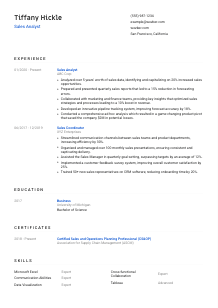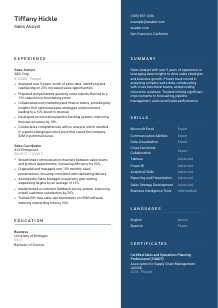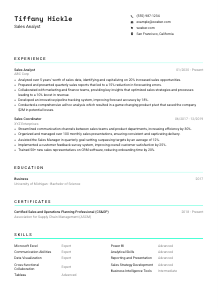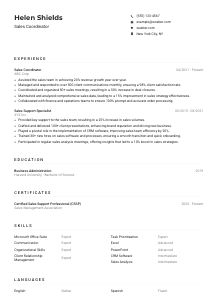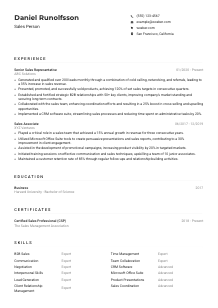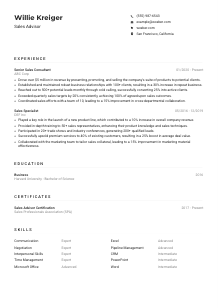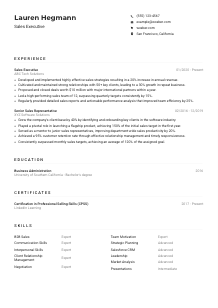Sales Analyst Resume Example
Crunching sales data, but your resume isn't adding up? Dive into this Sales Analyst resume example, formulated using Wozber free resume builder. Understand how to present your analytical insights and market acumen to align with the job criteria, positioning your career profile for strong sales and steady growth!
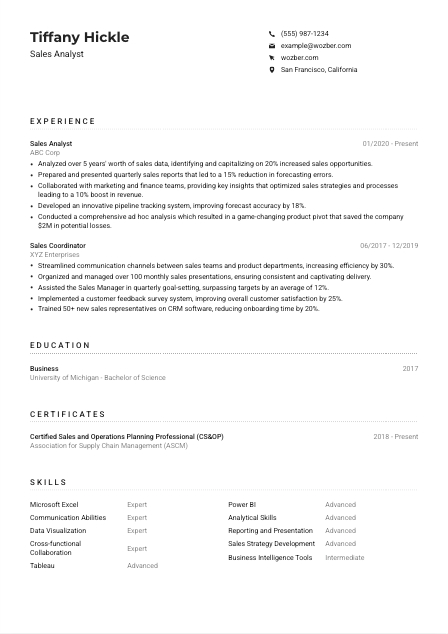
How to write a Sales Analyst resume?
Embarking on the journey to secure a Sales Analyst position? You're about to navigate the intricate world of balancing data analysis with strategic sales insights. A powerful resume is not just expected - it's your golden ticket to grab the attention of recruiters.
Leveraging Wozber's free resume builder, this guide will walk you through creating a resume that isn't just ATS-compliant but tailored to highlight your expertise. Let's tailor your resume into a compelling narrative that not only meets the job requirements but showcases your unique flair.
Personal Details
Even the journey of a thousand miles begins with a single step. In job hunting, your Personal Details section is that critical first step. Let's tailor it specifically for a Sales Analyst role, ensuring it speaks volumes, even in its brevity.
1. Present Your Name Prominently
Your name is the marquee of your professional identity. Ensure it's in a clear, prominent font at the top of your resume. This might seem basic, but in the sea of applications, you want to ensure your name sticks.
2. Match the Target Job Title
Right below your name, signal your professional alignment by specifying the position you're gunning for - in this case, "Sales Analyst". This technique immediately tells recruiters that your application is intentional, not just another shotgun blast in the job search game.
3. Ensure Contact Information is Pristine
A missing digit in your phone number or a typo in your email could mean a missed opportunity. Include a professional email and check it twice. Consider adding a LinkedIn profile to strengthen your biography, allowing recruiters to dive deeper into your professional presence.
4. Specify Your Locale
For this Sales Analyst role, being located in San Francisco, CA, is a distinct requirement. Highlight your San Francisco residency upfront. This communicates to recruiters that you're ready to hit the ground running without the obstacle of relocation.
5. Refrain from Including Unnecessary Personal Data
Let's keep it professional and relevant. Your marital status, age, or photo aren't just distractions – they're potential grounds for unconscious bias. Stick to the essentials that sell your professional self.
Takeaway
Think of the Personal Details section as the handshake before the conversation. It introduces you, sets the stage, and, when done rightly, seamlessly integrates your basic info into the context of the Sales Analyst role. Keep it professional, precise, and tailored, ensuring you're off to a fantastic start.





Experience
The Experience section is where the rubber meets the road. Here, you'll correlate your past roles and accomplishments directly with what recruiters are seeking for a Sales Analyst position. With an eye for detail and strategic alignment, let's make your professional journey gleam.
- Analyzed over 5 years' worth of sales data, identifying and capitalizing on 20% increased sales opportunities.
- Prepared and presented quarterly sales reports that led to a 15% reduction in forecasting errors.
- Collaborated with marketing and finance teams, providing key insights that optimized sales strategies and processes leading to a 10% boost in revenue.
- Developed an innovative pipeline tracking system, improving forecast accuracy by 18%.
- Conducted a comprehensive ad hoc analysis which resulted in a game‑changing product pivot that saved the company $2M in potential losses.
- Streamlined communication channels between sales teams and product departments, increasing efficiency by 30%.
- Organized and managed over 100 monthly sales presentations, ensuring consistent and captivating delivery.
- Assisted the Sales Manager in quarterly goal‑setting, surpassing targets by an average of 12%.
- Implemented a customer feedback survey system, improving overall customer satisfaction by 25%.
- Trained 50+ new sales representatives on CRM software, reducing onboarding time by 20%.
1. Dissect the Job Requirement
Grab that job description and identify the essential experiences. Noticing a preference for collaborative individuals with a knack for data-driven solutions? Align your previous roles to mirror these requirements.
2. Lay Out Your Professional Path
Keep it chronological, most recent first. This isn't just about job titles and dates; it's about telling a story. Each position should reveal a chapter in your growth as a Sales Analyst, narrating how you've evolved and what you've brought to previous teams.
3. Tailor Your Achievements
Reveal your impact through measurable achievements. Did your analysis uncover a 20% growth opportunity like in the resume example? That's gold. Highlight similar success stories, ensuring they resonate with what the Sales Analyst position demands.
4. Quantify Your Impact
Numbers speak volumes. A '15% reduction in forecasting errors' or '10% boost in revenue' are testimonials to your prowess. Such metrics underscore your contributions in the universal language of business outcomes.
5. Stay Focused
Yes, your brief stint in improvisational theater might have been transformative, but unless it directly informs your Sales Analyst capacity, park it for the interview chats. Keep your content relevant, always asking, 'Does this demonstrate my fit for the role?'
Takeaway
Your experience section is a narrative of your professional journey. Every bullet point is a proof point of your compatibility with the Sales Analyst role. Tailor each line to echo the job description, quantify your achievements, and you'll have created not just a resume but a compelling argument for why you're the perfect candidate.
Education
When shaping the Education section for a Sales Analyst application, it's not just about listing degrees. It's about crafting a backdrop that supports and amplifies your qualifications for the position. Let's dive in and shape your educational history into a solid foundation.
1. Zone in on the Required Credentials
A Bachelor's in Business, Finance, or a related field is our starting block. Ensure this qualification is front and center, crisply highlighted to pass both a six-second scan test and a deeper ATS analysis.
2. Structure for Clarity
Orderliness equals readability. List your degree, field of study, and awarding institution followed by the graduation date. This straightforward approach allows recruiters to quickly affirm your educational credentials.
3. Align Your Degree with the Job
Similar to our resume example, ensure your degree precisely matches the job specifications if possible. This direct correlation reinforces your suitability for the role right from the get-go.
4. Mention Pertinent Courses Only if Necessary
Unless freshly graduating or making a case for a specialized area within sales analytics, your degree title will suffice. Save the interview for discussions about standout courses or projects that are particularly relevant.
5. Spotlight Other Relevant Educational Honors
Achievements such as academic honors or leadership roles in relevant societies can be a nice touch, especially if they demonstrate qualities sought in a Sales Analyst. Gauge the appropriateness based on the seniority of the role you're applying for.
Takeaway
Your Education section is a testament to your foundational expertise for the Sales Analyst role. Craft it with purpose, prioritizing the qualifications that directly address the job criteria. Remember, every line on your resume should contribute to the story of why you are the ideal candidate.
Certificates
Certificates illuminate your resume, signaling an ongoing commitment to your profession. For a Sales Analyst, they can underscore specialized competencies or up-to-date industry knowledge. Let's navigate selecting and showcasing certifications that can help tilt the scales in your favor.
1. Identify Aligning Certifications
Start by reviewing the job posting for any preferred qualifications. Though not explicitly mentioned for this role, certifications like 'Certified Sales and Operations Planning Professional' can lend an extra layer of credibility.
2. Highlight Relevant Certifications
Choose to list certifications that bolster your application for the Sales Analyst position. This signals a proactive attitude and expertise in areas critical to the role. Quality over quantity rules this domain.
3. Date Your Achievements
For certifications, especially in dynamic fields like sales and analytics, validity matters. Mention when you earned your certifications to demonstrate current competency.
4. Keep Your Certifications Current
The business world moves fast, and staying informed is key. Regularly seek out new certifications that can advance your knowledge and reflect a commitment to your career trajectory.
Takeaway
The right certifications can elevate your resume from good to great, showcasing an ongoing investment in your professional growth. Choose wisely, ensuring they reflect both your expertise and the demands of the Sales Analyst role. And don't stop learning; the pursuit of knowledge is never over.
Skills
Highlighting your skills is akin to arming yourself for battle in the job market. For a Sales Analyst, this means a blend of technical prowess and soft skills that attest to your analytical and collaborative abilities. Let's sharpen your skills section for the perfect pitch.
1. Unpack the Job Listing
Decipher the job description to identify both the said and unsaid skills. Spot a call for proficiency in Tableau or Power BI? Make sure they're conspicuously placed in your skills list.
2. Prioritize Pertinent Skills
Align your skills with the job requirements, ensuring a mix of technical and interpersonal abilities. Proficiency in Microsoft Excel, communication prowess, and analytical aptitude are non-negotiables for a Sales Analyst.
3. Organize for Impact
Resist the urge to dump every skill you possess. Strategically organize your skills, starting with those most relevant to the Sales Analyst role. An ATS-compliant resume appreciates clarity and relevance.
Takeaway
Your skills section is a powerful testament to your capability to thrive as a Sales Analyst. Each skill you list should be a beacon, signaling your proficiency and readiness for the challenges of the role. Choose wisely, prioritize relevance, and keep honing your professional toolkit.
Languages
In the vast expanse of the Sales Analyst role, linguistic prowess can set you apart, particularly in global or multicultural settings. Let's strategically showcase your linguistic abilities, ensuring they echo the professional diversity and flexibility required in today's job market.
1. Evaluate the Job Requirements
Firstly, note any language requirements specified in the job posting. Proficiency in English is a must for this Sales Analyst role, so highlight it prominently.
2. Feature Essential Languages
If a specific language is a prerequisite, ensure it tops your list of linguistic abilities. For example, marking your proficiency in English as 'Native' directly aligns with the job's requirements.
3. Catalog Additional Languages
Other languages should follow in importance. Fluent in Spanish? That's a valuable asset, showcasing cultural adaptability and potential in multinational contexts.
4. Be Honest About Your Proficiency Level
Accurately categorizing your language skills—from 'Native' to 'Basic'—ensures transparent communication and sets realistic expectations about your ability to engage in different environments.
5. Consider the Role's Scope
For positions with an international flair or those requiring interaction with diverse teams, emphasizing your multilingual capabilities can distinguish your application, weaving in a narrative of global competence.
Takeaway
Flaunt your languages as more than just a line on a resume; they are a testament to your ability to navigate and thrive in a globally interconnected marketplace. For a Sales Analyst, every tool in your arsenal, including language, is a step towards a more nuanced understanding of the world's market trends.
Summary
A compelling Summary is your resume's opening act, setting the tone and framing your candidacy. For aspiring Sales Analysts, this means balancing analytical acumen with strategic insight right from the get-go. Let's craft a summary that packs a punch.
1. Capture the Essence of the Role
Delve into the job description, understanding the soul of a Sales Analyst. This role demands not just data savviness but a keen sense of business strategy. Your summary should echo this blend of skills.
2. Introduce Yourself
Lead with a bold statement that encapsulates your professional identity. 'Sales Analyst with over 5 years of experience in leveraging data insights...' sets a solid opening, immediately aligning you with the job's essence.
3. Address Key Requirements
Fold in specifics that the job demands - expertise in Tableau or Power BI, analytical prowess, and collaborative skills should shine through, doing justice to your role as a data interpreter and strategic advisor.
4. Keep It Crisp
Your summary is the elevator pitch, not the boardroom presentation. Aim for a vibrant, concise snapshot of your career highlights, keeping it to 3-5 impactful lines. Make every word count.
Takeaway
Your summary isn't just an introduction—it's a powerful declaration of your readiness and fit for the Sales Analyst role. By crafting a summary that mirrors the job's demands, you're setting the stage for a resume that resonates with purpose and precision. Let your summary herald the depth and breadth of your professional narrative.
Launching Your Sales Analyst Journey
Armed with these insights, crafting a Sales Analyst resume that resonates with recruiters is within your grasp. Each section of your resume is an opportunity to underscore your unique value proposition. Embrace this guide as a blueprint, utilize Wozber's free resume builder with its ATS-friendly resume templates, and let its ATS resume scanner fine-tune your application.
Your professional journey is brimming with potential—let your resume be the catalyst that propels you forward. Take the reins, and embark confidently on your path to success.

- Bachelor's degree in Business, Finance, or a related field.
- Minimum of 3 years of experience in sales analytics or a related field.
- Proficiency in data visualization tools such as Tableau or Power BI.
- Strong analytical skills with expertise in Microsoft Excel.
- Excellent communication and presentation abilities.
- Proficiency in English is key.
- Must be located in San Francisco, CA.
- Analyze sales data to identify trends, insights, and opportunities for improvement.
- Prepare regular reports on sales performance, pipeline, and forecast accuracy.
- Collaborate with cross-functional teams to understand business needs and provide data-driven solutions.
- Assist in the development and optimization of sales strategies and processes.
- Conduct ad hoc analysis and provide recommendations to senior management based on findings.





